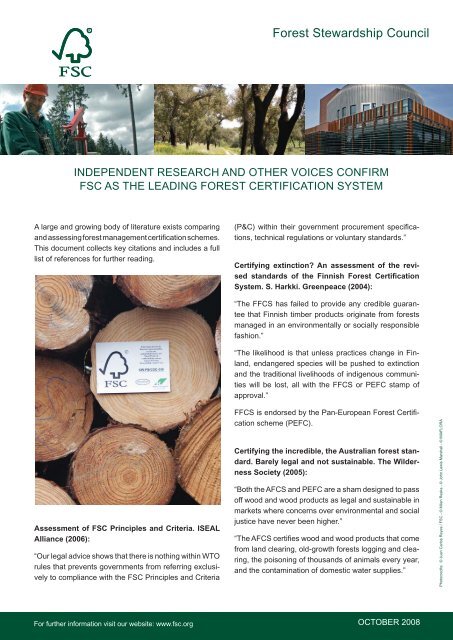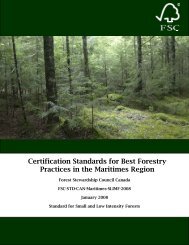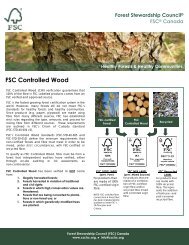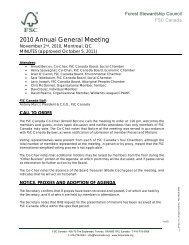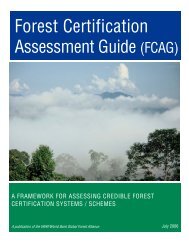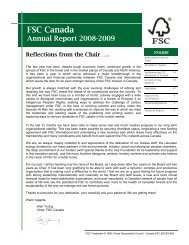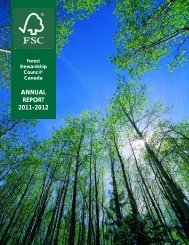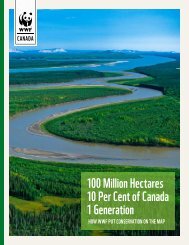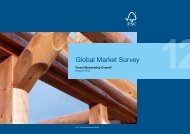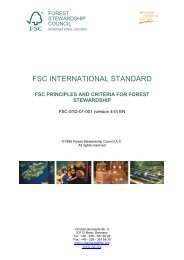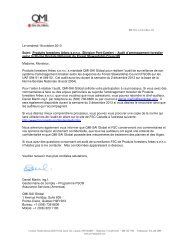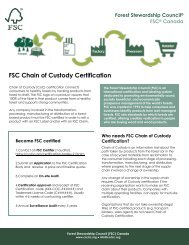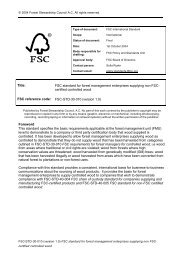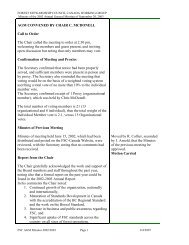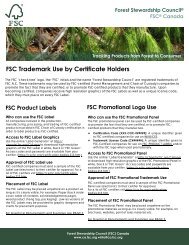Independent Reports on FSC PDF, Size: 219,25 KB Added - Forest ...
Independent Reports on FSC PDF, Size: 219,25 KB Added - Forest ...
Independent Reports on FSC PDF, Size: 219,25 KB Added - Forest ...
Create successful ePaper yourself
Turn your PDF publications into a flip-book with our unique Google optimized e-Paper software.
<strong>Forest</strong> Stewardship Council<br />
INDEPENDENT RESEARCH AND OTHER VOICES CONFIRM<br />
<strong>FSC</strong> AS THE LEADING FOREST CERTIFICATION SYSTEM<br />
A large and growing body of literature exists comparing<br />
and assessing forest management certifi cati<strong>on</strong> schemes.<br />
This document collects key citati<strong>on</strong>s and includes a full<br />
list of references for further reading.<br />
(P&C) within their government procurement specifi cati<strong>on</strong>s,<br />
technical regulati<strong>on</strong>s or voluntary standards.”<br />
Certifying extincti<strong>on</strong>? An assessment of the revised<br />
standards of the Finnish <strong>Forest</strong> Certificati<strong>on</strong><br />
System. S. Harkki. Greenpeace (2004):<br />
Assessment of <strong>FSC</strong> Principles and Criteria. ISEAL<br />
Alliance (2006):<br />
“Our legal advice shows that there is nothing within WTO<br />
rules that prevents governments from referring exclusively<br />
to compliance with the <strong>FSC</strong> Principles and Criteria<br />
“The FFCS has failed to provide any credible guarantee<br />
that Finnish timber products originate from forests<br />
managed in an envir<strong>on</strong>mentally or socially resp<strong>on</strong>sible<br />
fashi<strong>on</strong>.”<br />
“The likelihood is that unless practices change in Finland,<br />
endangered species will be pushed to extincti<strong>on</strong><br />
and the traditi<strong>on</strong>al livelihoods of indigenous communities<br />
will be lost, all with the FFCS or PEFC stamp of<br />
approval.”<br />
FFCS is endorsed by the Pan-European <strong>Forest</strong> Certifi -<br />
cati<strong>on</strong> scheme (PEFC).<br />
Certifying the incredible, the Australian forest standard.<br />
Barely legal and not sustainable. The Wilderness<br />
Society (2005):<br />
“Both the AFCS and PEFC are a sham designed to pass<br />
off wood and wood products as legal and sustainable in<br />
markets where c<strong>on</strong>cerns over envir<strong>on</strong>mental and social<br />
justice have never been higher.”<br />
“The AFCS certifi es wood and wood products that come<br />
from land clearing, old-growth forests logging and clearing,<br />
the pois<strong>on</strong>ing of thousands of animals every year,<br />
and the c<strong>on</strong>taminati<strong>on</strong> of domestic water supplies.”<br />
Photocredits: © Juan Carlos Reyes / <strong>FSC</strong> - © Milan Reska - © John Lewis Marshall - © IMAFLORA<br />
For further informati<strong>on</strong> visit our website: www.fsc.org<br />
OCTOBER 2008
OCTOBER 2008<br />
® <strong>FSC</strong>, A.C. All rights reserved. <strong>FSC</strong>-SECR-0002<br />
Collapse. J. Diam<strong>on</strong>d. Penguin (2005):<br />
“The effectiveness of the <strong>Forest</strong> Stewardship Council<br />
has received the ultimate compliment from logging companies<br />
opposed to it: they have set up their own competing<br />
certifi cati<strong>on</strong> organizati<strong>on</strong>s with weaker standards.<br />
These include the Sustainable <strong>Forest</strong>ry Initiative in the<br />
U.S., set up by the American <strong>Forest</strong> and Paper Associati<strong>on</strong>;<br />
the Canadian Standards Associati<strong>on</strong>; and the Pan-<br />
European <strong>Forest</strong> Council. The effect (and presumably<br />
the purpose) is to c<strong>on</strong>fuse the public with competing<br />
claims: for instance, the Sustainable <strong>Forest</strong>ry Initiative<br />
initially proposed six different labels making six different<br />
claims. All of these “knockoffs” differ from <strong>FSC</strong> in that<br />
they do not require independent third-party certifi cati<strong>on</strong>,<br />
but they permit companies to certify themselves (I’m not<br />
joking). They do not ask companies to judge themselves<br />
by uniform standards and quantifi able results (e.g., “width<br />
of the strips of riparian vegetati<strong>on</strong> fl anking streams”),<br />
but instead by unquantifi able processes (“we have a<br />
policy”, “our managers participate in discussi<strong>on</strong>s”). (...)<br />
The Pan-European <strong>Forest</strong> Council practices regi<strong>on</strong>al<br />
automatic certifi cati<strong>on</strong>, by which for instance the entire<br />
country of Austria became certifi ed quickly. It remains to<br />
be seen whether, in the future, these competing industry<br />
attempts at self-certifi cati<strong>on</strong> will be outcompeted by the<br />
<strong>FSC</strong> through losing credibility in the eyes of c<strong>on</strong>sumers,<br />
or will instead c<strong>on</strong>verge <strong>on</strong> <strong>FSC</strong> standards in order to<br />
gain credibility.” p.478/479<br />
C<strong>on</strong>fr<strong>on</strong>ting sustainability: <strong>Forest</strong> certificati<strong>on</strong> in<br />
developing and transiti<strong>on</strong>ing countries. B. Cashore,<br />
F. Gale, E. Meidinger, D. Newsom (ed.). Yale School<br />
of <strong>Forest</strong>ry and Envir<strong>on</strong>mental Studies (2006):<br />
“An intense competiti<strong>on</strong> has been waged for almost a<br />
decade now between <strong>FSC</strong> and industry-initiated certifi -<br />
cati<strong>on</strong> programs, which were established to offer a more<br />
“business friendly”, fl exible, and less stringent approach<br />
to forest management.”<br />
“Certifi cati<strong>on</strong> has had important social effects, especially<br />
in terms of community and workers rights. (…) Certifi -<br />
cati<strong>on</strong> has also had important ec<strong>on</strong>omic effects (…) at<br />
both the level of the fi rm and the level of the ec<strong>on</strong>omy<br />
as a whole.”<br />
C<strong>on</strong>suming Canada‘s Boreal <strong>Forest</strong>: The chain of<br />
destructi<strong>on</strong> from logging companies to c<strong>on</strong>sumers.<br />
Greenpeace (2007):<br />
“There is increasing recogniti<strong>on</strong> that the marketplace<br />
can have a signifi cant impact in shifting the way forestry<br />
is carried out <strong>on</strong> the ground and ending logging in intact<br />
forests. Individual c<strong>on</strong>sumers worldwide are increasingly<br />
demanding products that limit damage to the envir<strong>on</strong>ment<br />
and this c<strong>on</strong>cern is refl ected in the purchases they make.<br />
The evidence for this is seen in the growth of the variety<br />
and amount of papers manufactured from recycled and<br />
<strong>Forest</strong> Stewardship Council (<strong>FSC</strong>)-certifi ed materials<br />
and from lumber that is <strong>FSC</strong>-certifi ed. (…)”<br />
“One of the most effective ways to transform the practices<br />
of destructive logging companies is for corporate<br />
customers to demand resp<strong>on</strong>sible forestry certifi ed to<br />
the standards of the <strong>FSC</strong> (…).” p.5<br />
Does forest certificati<strong>on</strong> c<strong>on</strong>serve biodiversity? R.E.<br />
Gullis<strong>on</strong>. Cambridge University Press (2003):<br />
“The process of <strong>Forest</strong> Stewardship Council (<strong>FSC</strong>) certificati<strong>on</strong><br />
generates improvements to management with<br />
respect to the value of managed forests for biodiversity.”<br />
“Firstly, the <strong>FSC</strong> is the <strong>on</strong>ly internati<strong>on</strong>al certifi cati<strong>on</strong><br />
system with wide geographical coverage. (…) Sec<strong>on</strong>dly,<br />
the <strong>FSC</strong> standards have the greatest support from the<br />
envir<strong>on</strong>mental and social n<strong>on</strong>-governmental organizati<strong>on</strong><br />
(NGO) communities (…). Thirdly, the <strong>FSC</strong> has the<br />
greatest commitment to transparency (…).”<br />
Experiences with voluntary standards initiatives<br />
and related multi-stakeholder dialogues. B. Lang.<br />
GTZ (2006):<br />
“The <strong>Forest</strong> Stewardship Council (<strong>FSC</strong>) which has a tripartite<br />
structure in which social, envir<strong>on</strong>mental and ec<strong>on</strong>omic<br />
interest groups have equal voting weight enjoys a<br />
higher credibility with the general public and civil society<br />
in particular than alternative schemes which tend to be<br />
dominated by a single interest group.”<br />
<strong>FSC</strong> Internati<strong>on</strong>al Center GmbH · Charles-de-Gaulle-Strasse 5 · 53113 B<strong>on</strong>n · Germany<br />
Ph<strong>on</strong>e +49 (0) 228 367 66 0 · Fax +49 (0) 228 367 66 30 · fsc@fsc.org · www.fsc.org
OCTOBER 2008<br />
Footprints in the forest - Current practice and future<br />
challenges in forest certificati<strong>on</strong>. S. Ozinga, L. Krul.<br />
FERN (2004):<br />
“The eight forest certifi cati<strong>on</strong> schemes examined – AFS,<br />
CSA, CERFLOR, <strong>FSC</strong>, PEFC, SFI, MTCC and Certfor –<br />
clearly dem<strong>on</strong>strate how different certifi cati<strong>on</strong> schemes<br />
tell different stories and therefore will yield different<br />
results. (…) The problem is that most of these forest<br />
certifi cati<strong>on</strong> schemes certify the status quo thereby undermining<br />
the c<strong>on</strong>cept of certifi cati<strong>on</strong>. To give just <strong>on</strong>e<br />
example, all schemes assessed, with the excepti<strong>on</strong> of<br />
the <strong>FSC</strong>, allow for the c<strong>on</strong>versi<strong>on</strong> of forests to plantati<strong>on</strong>s.”<br />
“The <strong>FSC</strong> should still be seen as the benchmark for credible<br />
certifi cati<strong>on</strong>, as it has clear minimum performancebased<br />
nati<strong>on</strong>al standards and a balanced and inclusive<br />
decisi<strong>on</strong>-making process. It is also transparent and has<br />
well developed certifi cati<strong>on</strong>, accreditati<strong>on</strong>, chain of custody<br />
and labelling procedures.”<br />
Governing through markets: <strong>Forest</strong> certificati<strong>on</strong> and<br />
the emergence of n<strong>on</strong>-state authority. B. Cashore,<br />
G. Auld, D. Newsom. Yale University Press (2004):<br />
“Overall the study reveals that the gulf between the <strong>FSC</strong><br />
and <strong>FSC</strong> competitors is still wide, with signifi cant differences<br />
over the use of exotics, genetically modifi ed organisms,<br />
chemicals, and governance mechanisms.”<br />
Missing links - Why the Malaysian Timber Certificati<strong>on</strong><br />
Council (MTCC) certificate doesn’t prove that<br />
MTCC timber is legal nor sustainable. Greenpeace<br />
(2005):<br />
“Greenpeace c<strong>on</strong>cludes that the MTCC scheme, in its<br />
present form, cannot be c<strong>on</strong>sidered to provide suffi cient<br />
guarantees that MTCC timber offered in the marketplace<br />
– in Europe or elsewhere – is fully derived from legal and<br />
sustainable sources.”<br />
On the ground - <strong>Forest</strong> certificati<strong>on</strong>: green stamp<br />
of approval or rubber stamp of destructi<strong>on</strong>? A. Tan.<br />
<strong>Forest</strong>Ethics, Greenpeace & Sierra Club Canada<br />
(2003):<br />
“The preference for <strong>FSC</strong> is informed by sound scientifi c<br />
evidence that industrial forestry as practiced in the past<br />
and present has unacceptable costs, including the loss<br />
of key wildlife species such as grizzly bears, ruined<br />
water supplies and rapidly eroding soils. And where<br />
there are ecological costs, there are bound to be social<br />
and ec<strong>on</strong>omic costs, costs that are disproporti<strong>on</strong>ately<br />
borne by indigenous peoples and rural communities the<br />
world over.”<br />
“That’s why <strong>FSC</strong> remains the <strong>on</strong>ly viable certifi cati<strong>on</strong><br />
system at this time, and why the general public and forest<br />
product buyers should reject CSA/SFI certifi cati<strong>on</strong>s that<br />
simply rubber-stamp the status quo.”<br />
Legal forest destructi<strong>on</strong> - The wide gap between<br />
legality and sustainability. IUCN, Greenpeace, ICCO,<br />
Milieudefensie, NCIV & WWF (2006):<br />
“Clear safeguards are needed to prevent the endorsement<br />
of ineffective licensing systems and illegitimate<br />
and unsustainable practices, particularly with regards<br />
to forest certifi cati<strong>on</strong> schemes as a number of these<br />
schemes have been heavily criticised for being corrupted<br />
and ineffective for the verifi cati<strong>on</strong> of legality.”<br />
“Adopt a “truly green” procurement policy, with 100% of<br />
its purchased timber from sustainable managed forestry<br />
operati<strong>on</strong>s, which are certifi ed at least to the standards<br />
demanded by the <strong>Forest</strong> Stewardship Council. Do not<br />
procure forest products from certifi cati<strong>on</strong> schemes that<br />
do not guarantee legality and sustainability.”<br />
Partnerships in forest governance. I. Visseren-<br />
Hamakers, P. Glasbergen. Global Envir<strong>on</strong>mental<br />
Change 17, 408-419 (2007):<br />
“The <strong>FSC</strong> is the <strong>on</strong>ly partnership in which social and<br />
envir<strong>on</strong>mental interests have their own formal place in<br />
the organisati<strong>on</strong>.”<br />
“The effectiveness of the different certifi cati<strong>on</strong> schemes<br />
also differs. The <strong>FSC</strong> is the most stringent and inclusive.<br />
The <strong>FSC</strong> clearly specifi es the level of performance or<br />
results that must be achieved in a forest; it is a performance<br />
based system. It also addresses issues that the<br />
others do not.”<br />
“There seems to be a trend for partnerships to choose<br />
for less stringent and less inclusive approaches towards<br />
<strong>FSC</strong> Internati<strong>on</strong>al Center GmbH · Charles-de-Gaulle-Strasse 5 · 53113 B<strong>on</strong>n · Germany<br />
Ph<strong>on</strong>e +49 (0) 228 367 66 0 · Fax +49 (0) 228 367 66 30 · fsc@fsc.org · www.fsc.org
OCTOBER 2008<br />
® <strong>FSC</strong>, A.C. All rights reserved. <strong>FSC</strong>-SECR-0002<br />
sustainability. The <strong>FSC</strong> and RSPO are the <strong>on</strong>ly excepti<strong>on</strong>s<br />
(…). If this trend c<strong>on</strong>tinues, the added value of partnerships<br />
in the forest biodiversity governance system<br />
will remain limited. (…) Often, the more diffi cult issues,<br />
like indigenous peoples’ rights or the use of GMOs, are<br />
not (thoroughly) addressed.”<br />
Public procurement and forest certificati<strong>on</strong>:<br />
Assessment of the implicati<strong>on</strong>s for policy, law and<br />
internati<strong>on</strong>al trade; Comparing major certificati<strong>on</strong><br />
schemes: <strong>FSC</strong>, PEFC, CSA, MTCC and SFI. P. Sprang,<br />
N. Meyer-Ohlendorf. Ecologic Briefs (2006):<br />
“Findings indicate that the <strong>FSC</strong> operates strictly under<br />
publicly available performance standards which are<br />
generally more strict than those of other schemes. <strong>FSC</strong><br />
shows a higher audit intensity than other schemes.”<br />
“Generally, it can be c<strong>on</strong>cluded that the <strong>FSC</strong> has more<br />
checks and balances in place to keep inc<strong>on</strong>sistency at a<br />
minimum while providing clear evidence of its impact <strong>on</strong><br />
forest management.”<br />
The effects of <strong>FSC</strong> certificati<strong>on</strong> in Est<strong>on</strong>ia, Germany,<br />
Latvia, Russia, Sweden and the UK. WWF (2005):<br />
“The analysis across 6 countries shows that <strong>FSC</strong> certifi -<br />
cati<strong>on</strong> is delivering a number of benefi ts for a wide range<br />
of stakeholders in the forest industry, and provides hard<br />
evidence of tangible improvements that the voluntary<br />
mechanism of credible certifi cati<strong>on</strong> delivers for society,<br />
the envir<strong>on</strong>ment and the ec<strong>on</strong>omy.”<br />
“Certifi cati<strong>on</strong> to the <strong>FSC</strong> standards has dem<strong>on</strong>strated<br />
across Europe that it can c<strong>on</strong>sistently raise the standard<br />
of forest management.”<br />
The effects of PEFC-certificati<strong>on</strong> - An analysis of<br />
audit reports of PEFC Germany. WWF (2005):<br />
“Certifi cati<strong>on</strong> under PEFC c<strong>on</strong>verses the status quo in<br />
forest management with its strengths, but also with its<br />
weaknesses.”<br />
“Most of the corrective acti<strong>on</strong>s by PEFC are <strong>on</strong>ly<br />
recommendati<strong>on</strong>s a forest owner can ignore without any<br />
c<strong>on</strong>sequences.”<br />
What role for private rule-making in global envir<strong>on</strong>mental<br />
governance? Analysing the <strong>Forest</strong> Stewardship<br />
Council. P. Pattberg. Springer (2005):<br />
“By bringing together many different actors and interests<br />
within <strong>on</strong>e forum, by verifying these commitments, and<br />
by providing a model for other actors and other issue<br />
areas, the <strong>FSC</strong> provides an instituti<strong>on</strong>alised soluti<strong>on</strong> to<br />
global envir<strong>on</strong>mental problems.”<br />
WWF Positi<strong>on</strong> Paper <strong>on</strong> <strong>Forest</strong> Certificati<strong>on</strong> (2007):<br />
“In collaborati<strong>on</strong> with the World Bank, WWF has developed<br />
a methodology, The <strong>Forest</strong> Certifi cati<strong>on</strong> Assessment<br />
Guide (FCAG), and used it to evaluate various<br />
certifi cati<strong>on</strong> schemes. These assessments, as well as<br />
other WWF evaluati<strong>on</strong>s, dem<strong>on</strong>strate that, while there<br />
is c<strong>on</strong>siderable room for improvement in all schemes,<br />
<strong>Forest</strong> Stewardship Council (<strong>FSC</strong>) certifi cati<strong>on</strong> best<br />
meets WWF‘s key requirements. Thus, while WWF<br />
acknowledges that several schemes may c<strong>on</strong>tribute to<br />
improve forest management, the organizati<strong>on</strong> will c<strong>on</strong>tinue<br />
to focus its active efforts <strong>on</strong> improving the <strong>FSC</strong><br />
system, <strong>on</strong> adapting <strong>FSC</strong> certifi cati<strong>on</strong> to different scales<br />
and nati<strong>on</strong>al c<strong>on</strong>texts, and <strong>on</strong> promoting the <strong>FSC</strong> logo<br />
as an internati<strong>on</strong>ally recognized hallmark of resp<strong>on</strong>sible<br />
forest management.”<br />
WWF Press release in reacti<strong>on</strong> to: Review of forest<br />
certificati<strong>on</strong> schemes, Central Point of Expertise <strong>on</strong><br />
Timber - CPET (2006):<br />
“…major envir<strong>on</strong>mental groups, including WWF, Greenpeace,<br />
Friends of the Earth and FERN, criticized the<br />
[UK] government’s decisi<strong>on</strong> to allow its departments<br />
to purchase wood products certifi ed by schemes that<br />
allow destructive logging practises, by accepting them<br />
as proof of sustainability.”<br />
“The <strong>on</strong>ly certifi cati<strong>on</strong> scheme currently recognised as<br />
credible by industry, NGOs and indigenous peoples<br />
groups alike is the scheme operated by the <strong>Forest</strong> Stewardship<br />
Council (<strong>FSC</strong>).”<br />
<strong>FSC</strong> Internati<strong>on</strong>al Center GmbH · Charles-de-Gaulle-Strasse 5 · 53113 B<strong>on</strong>n · Germany<br />
Ph<strong>on</strong>e +49 (0) 228 367 66 0 · Fax +49 (0) 228 367 66 30 · fsc@fsc.org · www.fsc.org


